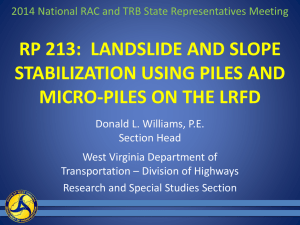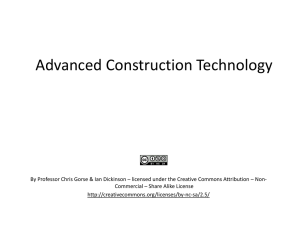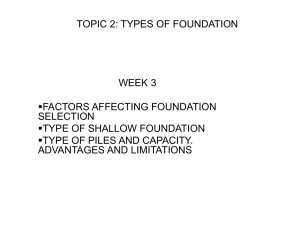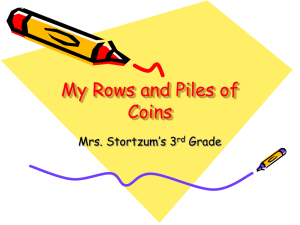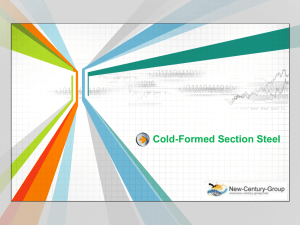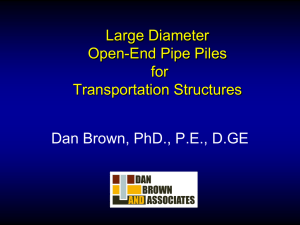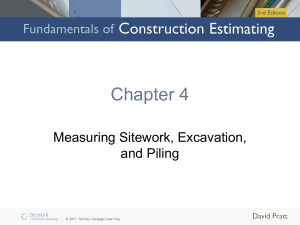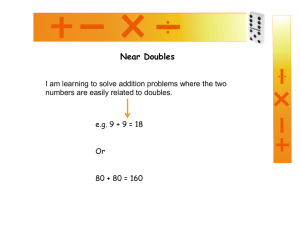SHEET PILES CONSTRUCTION
advertisement
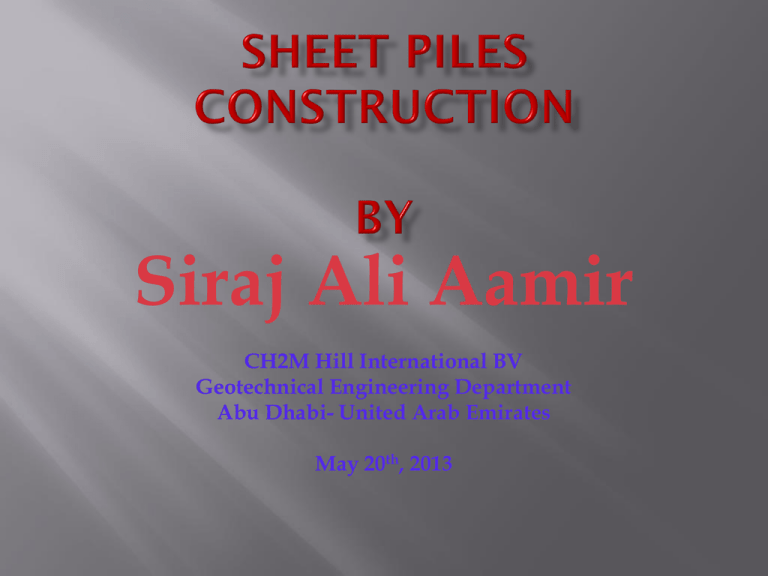
Siraj Ali Aamir CH2M Hill International BV Geotechnical Engineering Department Abu Dhabi- United Arab Emirates May 20th, 2013 Steel sheet pile walls are constructed by driving steel sheets into a slope or excavation. Their most common use is within temporary deep excavations. They are considered to be most economical where retention of higher earth pressures of soft soils is required. They have an important advantage in that they can be driven to depths below the excavation bottom and so provide a control to heaving in soft clays or piping in saturated sands. This is not possible with the Soldier pile which is also a more permeable structure. However sheet piles are more costly and less adaptable to hard driving conditions particularly where boulders or irregular rock surfaces occur. Easy driving conditions are experienced in clays, sands, and clayey sand mixture due to the comparatively small displacement of soil. However they may permit large movements in weak soils and also effective de-watering is often required since they do not provide a watertight boundary. Seepage commonly occurs through the interlocks and this can be sufficient enough to cause consolidation of organic soils and soft Silty clays, (compressible materials). For sandy soils ravelling will not occur if the interlocks are tight, but driving sheet piles into loose sand can cause subsidence. Depending upon the material used in their manufacture, some of the types of sheet piles are: Wooden sheet piles Precast concrete Sheet piles Pre-stressed concrete sheet piles Steel sheet piles 1. Wooden sheet piles: 1. 2. 3. 4. In places where excavation is small and the ground water problem is not serious, 5 cm x 30 cm to 10 cm x 30 cm wooden planks arranged in a simple row will serve the purpose. Each pile is made up of two planks, either spiked or bolted to one another. If the water-tightness is required to a great extent, lapped sheet piling is used. If complete water tightness is desired or pressure of the retained material Wakefield or tongue and grooved sheeting is generally used. Wakefield piles: 1. This type of pile is made with three planks, 5 cm, 8 cm or 10 cm in thickness. 2. The planks are nailed together with the middle plank offset forming a tongue on one edge and a groove on the other. 3. The planks are connected by using a pair of staggered bolts at 80 cm centre to centre at intermediate points. 4. The triple lap piles prove stronger in driving. There is no wastage in forming the tongue and groove joints and the piles have fewer tendencies to warp. 5. Timber sheet piles have light weight and as such the equipment required for pile driving is also light. 2. Precast concrete sheet piles: Precast concrete piles are made in square or rectangular cross-section and are driven similar to wooden piles to form a continuous wall. The interlock between two piles is normally provided with the help of tongue and groove joint. The tongue and grooves extend to the full length of the piles in most of the cases. An alternative method of providing joint between two piles is shown below. In this method, after the piles are driven to the required depth, the joint is grouted with cement mortar 1: 2 (1 cement: 2 sand). The piles are reinforced to avoid formation of cracks due to rough handling or shrinkage stresses. Reinforced concrete sheet piles are bulky and heavy and as such they are gradually being superseded by prestressed concrete piles. In order to reduce the possibility of damage due to driving impact, the stirrups should be spaced closely near the top and bottom of the piles. 3. Pre- Stressed Concrete Sheet Piles: pre-stressed concrete sheet piles are commonly used for sheet piling jobs. They are reinforced on both the faces so that they could be handled from either side. They are comparatively lighter in weight, more durable and economical in the long run. They are advantageously used in sea water, since the danger of cracking of concrete is negligible and also the corresponding danger of corrosion of pile reinforcement is reduced. 4. Steel sheet piles: Steel sheet pile is a rolled steel section consisting of a plate called the web with integral interlocks on each edge. The interlocks consist of a groove, one of whose legs has been suitably flattened. This flattening forms the tongue which fits into the groove of the second sheet. Commonly used sheet piles can be broadly divided into the following three categories: Straight-web type Shallow or deep arched-web type Z web type The selection of the type of pile and the section to be adopted depend upon the depths up to which the pile is to be driven, the nature of soil to be penetrated the elevation of the earthen embankment, ground water level etc. Straight web type of piles are used where the piles are liable to be subjected to tensile forces and interlocking strength is of prime importance (Cellular cofferdam etc). Arched-web type are used where the piles are required to resist bending stresses (in cantilever retaining walls etc,) Z-web type of piles arc used where the piles are required to resist bending stresses of very large magnitude. Advantages: Steel sheet piles are driven with the help of pile drivers which may be of drop hammer type or single or double acting hammer driven by steam or compressed air. The outstanding feature of steel sheet piles is that they can be used for greater depths. The continuous interlocking arrangement of the piles gives strength and rigidity to the supported structure. A wall made from properly driven sheet piles leaks very little, hence steel sheet piling is used with advantage in the construction of deep cofferdams. They are commonly used in coastal defence works which are likely to be subjected to tidal action. Z-Type Steel Sheet Piling: Z-shaped sheet piles are called Z’s, because the single piles are shaped roughly like a horizontally stretched Z. The interlocks are located as far away from the neutral axis as possible to ensure good shear transmission and increase the strength-to-weight ratio. Z piles are the most common type of sheet pile in North America and can be used in a wide variety of applications. Retaining walls, cofferdams, parking garages, environmental barrier walls, and bulkhead walls for ports are just a few of their varied uses. Types Based on Interlocking & Degree of Swing: 1. AZ Sheet Piles: The AZ range of sheet piles is the most advanced in the world. Arbed introduced the AZ line in 1990 and is committed to continuously improving the sections through ongoing, aggressive research. The AZ's now cover the widest range of strengths representing the strongest, most efficient sheet piles in the industry. 2. PZ Sheet Piles PZ sections have been manufactured in the US for many years and are widely recognized by the ball and socket interlock. The PZ sections are good sections for reuse because of their compactness and the durability of the interlock. The ball and socket interlock also allows as much as ten degrees of swing for turning tight curves on the jobsite 3. SCZ/SKZ Sheet Piles SCZ/SKZ piles are cold formed sheet piles produced from steel coil. SCZ/SKZ shapes are generally wide, light, and efficient and are usually used in lighter applications than hot rolled sheets. There are many options to choose from due to the ease of manufacturing. The variety of SCZ/SKZ sections is made up of five different sizes in several thicknesses. The interlock on the SCZ/SKZ piles allows 10 degrees of swing. Flat sheet piles work differently from other sheet piles. Most sheet piles rely on their bending strength and stiffness to retain the soil or water. Flat sheet piles are formed in circles and arcs to create gravity cells. The cells are held together through the tensile strength of the interlock. The tensile strength of the lock and the allowable rotation of the lock are the two main design characteristics. The flat sheet pile cells can be made to huge diameters and heights and withstand a great deal of pressure. 1. AS Sheet Piles AS sections are the strongest flat sheets in the world. The high interlock strength allows very tall, large diameter cells to be built. The AS sheets can swing 4.5 degrees per interlock for most piles and any pile over 65.6 feet (20 m), in length has 4.0 degrees of allowable swing. There are a total of five different thicknesses for the AS 500 series, allowing the piles to be sized to fit almost any project. 2. PS Sheet Piles The PS sheets are an American-made flat sheet with a very large allowable swing. The 6.2 degree swing per interlock allows designers to configure very small cells. There are currently two PS sections made and they can handle almost all flat sheet piling requirements. U sheet piles retain soil and water just like Z piles with one important difference: U piles have the interlock on the neutral axis. The placement of the lock in the centerline of the wall reduces the efficiency of the section and can cause reduction of section properties because of shear transfer problems. 1. AU/PU Sheet Pile The AU and PU sections are some of the most efficient U piles on the market. The AU series is very wide, making it an excellent option for environmental applications. The pan shaped cold form sheet piles are much smaller than most other sheet piles and are only intended for short, lightly loaded walls. The pan type sections are often used on drainage ditches, retaining walls on private homes, and golf courses. 1. SKL Sheet Piles: The SKL range is specifically designed for the lightest retaining walls. The sections are very light so they can be handled and installed with small equipment. The profile is also only 3.5 inches deep so it can be installed in locations with limited space. 2. SKS Sheet Piles: The SKS range is slightly larger than the SKL range. The SKS sheets are very wide so they are excellent for low, long walls where speed of construction is important.
